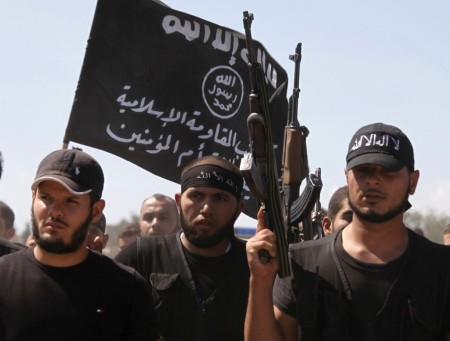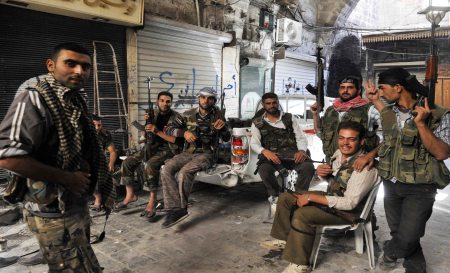Wassim Ibrahim As-Safir
If you listen to NATO’s evaluation and then go back to the warnings issued by European countries against the phenomenon of foreign fighters in Syria, you cannot help but wonder: Where is political trickery and where is reality in all of this?
Away from speculation, there seems to be a determination to keep this issue as a field for security and political games, instead of dealing with it as a headline for security threats.
NATO chiefs of staff met in Brussels, and the Syrian war issue was among the discussed topics. In his closing statement, Chairman of the NATO Military Committee Gen. Knud Bartels said that recent events in Ukraine, Syria, and the Sahel region “have reinforced the need for NATO to be ready for a wide range of potential threats both near and far abroad.”
NATO commanders have always said that NATO is not only a military organization, but also a security organization that works accordingly. This includes monitoring and surveillance operations, information exchange and military intelligence work. But NATO has thus far been careful not to address the issue of Western jihadist fighters.
This would have been tolerable had the NATO countries, both in Europe and the United States, not been persistently saying that these fighters make up a “security threat.” A couple of days ago, French Interior Minister Bernard Cazeneuve noted during the Brussels conference that the phenomenon is “a European and international problem.”
So, how does NATO assess this problem, and why hasn’t it clearly announced it as a security threat? As-Safir raised this question with Bartels, who replied with a careful tone, “The entire region is affected by the events in Syria, which have significant implications in general. We have not tackled some of the details of the issues that I just mentioned, but Syria is a source of very serious concerns to all, because the Middle East’s destabilization through this conflict is in no one’s interest.”
Bartels avoided replying to the main part of the question, which would have been fine had he been addressing a gathering on a certain occasion. So, we insisted on receiving an accurate answer. How can he talk with such generality, while many of the NATO nations are warning against the return of jihadist fighters and establishing international cooperation platforms to contain them? Are they joking with us?
While avoiding provocation, Bartels answered, “I cannot see the difference between what you are talking about and what I just said. We really believe that the Syrian issue is a very serious issue that has implications on NATO’s security, which is why we highlighted it. As far as I know, no one is joking with anyone here.”
A general who gained fame during recent months was sitting next to Bartels: Philip Breedlove, NATO’s commander in Europe. Since he has elaborately spoken about the security threats and prospects, especially as far as the Ukrainian issue is concerned, As-Safir asked him about NATO’s actual assessment of the foreign fighters phenomenon. Breedlove said, “Foreign fighters are a source of concern for all of the NATO countries because these countries have individuals in Syria who are becoming extremists and are joining the fighting parties there.”
“Eventually, they will return to their homelands or another NATO country. This is why our states are concerned,” he added.
These are clear and straightforward statements. Thus, what explains the silence of NATO? Breedlove answered, “I do not agree with you that we are standing idly by without providing any help. NATO’s nations are cooperating on a large scale on this issue.” Breedlove did not delve into further details.
Undoubtedly, NATO can play a role in this matter, if it wishes so. In this context, a military expert, who preferred to speak on condition of anonymity, said that the issue of foreign fighters is “related to the security of civilians and not military security for NATO to intervene.”
“Should NATO’s military units intervene, they will obstruct the work of the intelligence in the concerned states,” said the expert. A NATO military official close to the leadership of his troops in Europe supported the expert’s statements. He added, “This is an issue that cannot be dealt with by using military capabilities.”
However, there is a contradictory explanation to this effect. NATO has been engaged in operations it deemed as a security threat, which was not relative to the military aspect. The counter-piracy operations it is leading off the coast of Somalia are proof of that. Pirates are not officers or led by a marshal, yet NATO seeks to monitor their movements and operations.
Nevertheless, the technical explanation entails some gaps. According to the military expert, including foreign fighters explicitly on NATO’s agenda is possible if requested by one of its states, especially Turkey. However, Ankara did not request this and did not raise the issue at this level, even though the matter is critical given its effects on the overall security situation. NATO’s forces are fighting in Afghanistan against what they call al-Qaeda and its allies. However, al-Qaeda-affiliated groups that NATO would be fighting in Afghanistan, come and go through Syria’s borders with Turkey, Iraq, Jordan, and Israel, as they please.
Given the responses of NATO’s officials, it seems that the alliance’s countries prefer dealing with jihadist militants in a political and security context, especially when it comes to Turkey, as it is most affected by this issue. Thus, things will remain a political tool in the hands of intelligence, which can be used according to the developments of the Syrian war, without overlooking its own interests. Europeans say they do not want their fighters to travel, but most importantly they do not want them to return. Turkey is running the entire file under the table, while in public it declares it cannot control its border.
Eventually, had NATO wanted to deal with the issue of jihadist fighters as a security threat, it would have done so decisively and without any justifications. There are about 2,000 extremist fighters who are likely to return to NATO’s nations and they pose surely a greater threat than pirates with small boats in the Indian Ocean.
But unlike the Somalian pirates, the jihadist militants are a political tool first and a security threat second.


Keine Kommentare:
Kommentar veröffentlichen